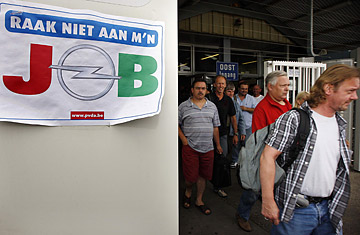
Workers walk past a poster, which reads: "Don't touch my job", as they leave the Opel assembly plant in Antwerp.
After weeks of twists and turns in the battle for control of General Motors' European unit Opel, the U.S. car giant finally made up its mind Thursday and decided to sell a majority stake to a bid headed by Canadian car-parts firm Magna, albeit with strings attached. The deal came as something of a surprise; over the past few days there has been feverish speculation in Berlin that GM had decided to hang onto Opel in Germany as well as its Vauxhall brand in the U.K.
German government officials were left in the dark over GM's intentions until the very last minute. One government official said he had "no idea" what GM had decided, and union leaders were still claiming GM wanted to keep Opel and Vauxhall.
In the end, GM's CEO Fritz Henderson phoned Chancellor Angela Merkel's office Thursday to seal the deal. The decision to sell Opel and Vauxhall to Magna is a coup for Merkel who has staked her credibility on the bid, a joint offer from the Canadian car-parts manufacturer and Russia's state-owned Sberbank. Since May, Merkel and the German government have thrown their weight behind Magna's offer, arguing that Magna already had extensive experience in building autos. Berlin also likes the fact that the Magna bid will keep open Opel's four factories in Germany, thus saving more jobs there than rival proposals.
At a hastily arranged news conference on Thursday afternoon, Merkel, an often serious, even dour leader, was overjoyed when she broke the news. "I am exceptionally happy about this decision, which is along the lines of what the government wanted," she said. "It's clear the patience and determination of the government paid off in the end."
Merkel's government announced it would bankroll the Magna bid in May, pledging $2.1 billion as a bridge loan to keep Opel afloat, as well as $4 billion in future loan guarantees. The German government also made it clear it wouldn't stump cash for any other bidder. Some politicians accused Merkel of "blackmail" and warned that her government's support for Magna could backfire. Initially, GM had serious reservations about Magna's offer and seemed to favor a rival bid by the Belgian-based investor, RHJ International. One GM official said RHJ's offer was "simple and elegant." In particular, GM was uncomfortable with a Russian company getting its hands on Opel's technical expertise and patents.
With Germany's federal election on Sept. 27 looming, GM's decision provides a huge boost for Merkel, whose conservative Christian Democrats are already well ahead in the opinion polls. Opel employs 25,000 workers in Germany — around half of GM Europe's total workforce. German unions threatened mass demonstrations if GM decided to keep Opel, fearing that option would lead to thousands of job losses in Germany. With the green light for Magna, Merkel has received an important psychological boost and can now tell voters on the campaign trail that she managed to save German jobs.
Still, even the chancellor admitted the "new beginning wouldn't be easy." Under the deal, Magna and Sberbank will own 55% of the "New Opel", GM will keep 35% and the company's workers will take a 10% stake. GM's chief negotiator John Smith, who flew in from Detroit for a Berlin news conference, said Magna had come up with the best offer. "Magna has a great manufacturing culture and it enjoys the support of German labour unions, and the funding is there. It makes sense," said Smith. But he also warned of job-cuts. Magna's bid outlined a plan to wind down production at GM's factory in Antwerp, Belgium, and shift some production from a Spanish plant to Germany. Magna executives have said that 10,000 jobs might be axed across Europe. Opel's union chief, Klaus Franz, welcomed news of the deal. "I'm pleased and I'm relieved but I'm not exactly euphoric," Franz told TIME. "I know that hard work lies ahead of us."
That hard work will include further negotiations between GM and the German government. GM wants to keep some ties to Opel's engineering presence in Germany and also retain a veto over any transfer of its technology to Russia. There are also thorny issues over the details of the financing package to work out, though Merkel said today she was confident the obstacles could be overcome. GM's Smith, said he hoped the deal could be closed by November or December. If that happens, America's biggest auto company will finish 2009 in a very different state than it started it.
